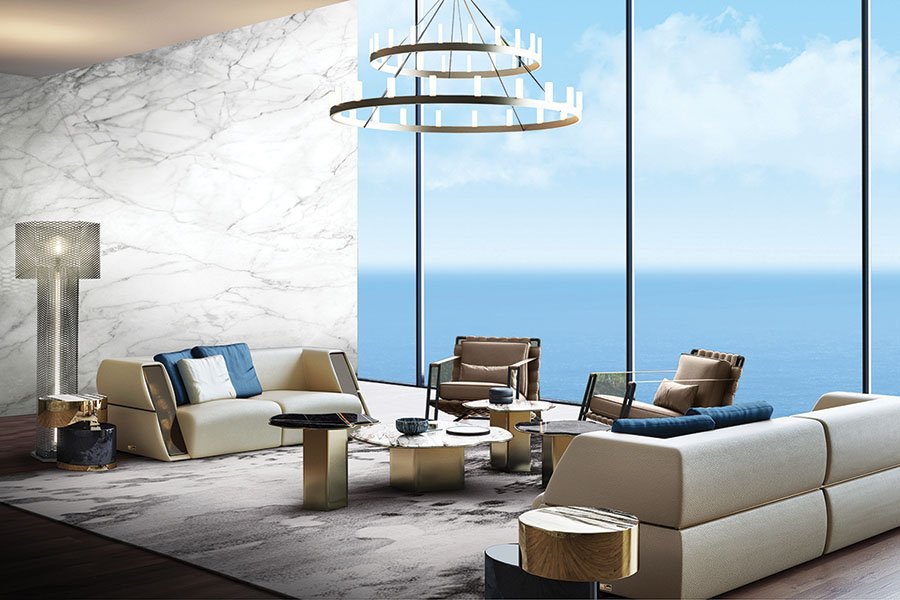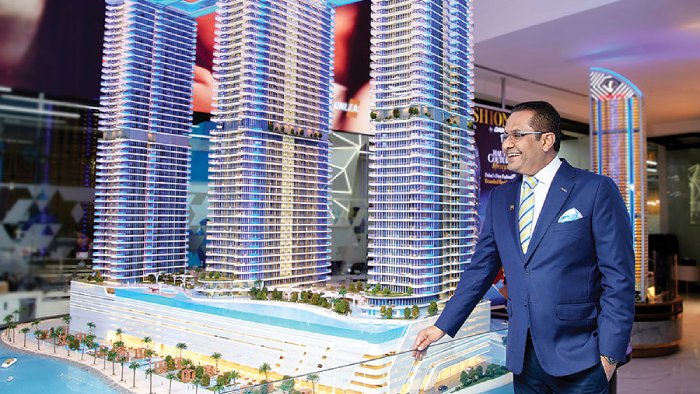Is there anything common between Aston Martin, Fashion TV, Tonino Lamborghini Casa and Filmfare on one side, and the slums of Mumbai, one of the largest building materials companies in Dubai, and Danube Group—a diversified business conglomerate which clocked a turnover of $2 billion last year—on the other side? There is only one: Rizwan Sajan. The first-generation entrepreneur was born in the slums of Ghatkopar in Mumbai. After dropping out of school, he landed a job as a salesman in Kuwait, founded a trading firm in Dubai in 1993, went on to buy the rights for Filmfare magazine in the Middle East, and is now building luxury apartments and villas that have a tie-up with brands such as Aston Martin, Fashion TV and Tonino Lamborghini Casa to take care of the interiors of a suite of luxury residential projects.
If you haven’t noticed the Danube Group, you are not watching enough TV, especially the ongoing cricket World Cup matches where the Dubai-based conglomerate with interests in building materials, home décor and real estate has been feverishly advertising, or you have not been flying top Indian airlines where one can spot stickers of ‘The 1% Man’ plastered on the rear side of the headrest of the seats. Over the last few months, Sajan and his Danube Group have been relentlessly wooing Indians to buy high-end and luxury residential properties in Dubai by pitching the country as a great investment destination.
From the slums to luxurious towers, how does one explain the fairytale journey? The entrepreneur starts the conversation by expressing his gratitude. “God has been kind,” smiles Sajan, who ventured into the real estate market of the Middle East in 2014, rolled out 25 residential projects in the UAE over the last nine years, including 10 in the last 19 months, and is trying to make luxury affordable by launching a 1 percent per month payment plan. “How much of your success is luck, and what would be the share of hard work?” I ask as I try to make sense of his rags-to-riches story. “I would give them equal chances,” he again flashes his endearing smile.

However hard you work, Sajan underlines, if lady luck is not on your side, you will fail. “Similarly, even if you’re lucky but you don’t work hard, you are bound to fail,” he adds. The clichéd mantra—right person, at the right time and at the right place—to a large extent explains the meteoric rise of the man who had a rough childhood.
Sajan takes us back to his rocky early days in Mumbai. There were traces, though, of luck which the young lad couldn’t realise during his hardship years. His father miraculously won a ‘subsidised’ lottery, moved his family into a tiny apartment, and tried his best to look after the family. Though he managed to pay the tuition fees for the kids, it was never enough. Young Sajan, with his sisters, used to walk a few kilometres to reach school. The pocket money—₹15 in total for all the kids—was never sufficient for the young ones who could barely buy anything from the school canteen. The young boy decided to do his bit to earn some money. He implored his dad to lend ₹1,000, and started his early journey into rudimentary trading.
Sajan’s low-lying fruit—call it the catchment area—turned out to be his schoolmates. He bought books in bulk, sold them to his friends at the market rate, and started making some extra bucks. “Now I could buy food from the canteen,” he recalls. The next gig was selling milk in the locality and making the most of a log tail of festivals round the year. From sourcing rakhis to selling firecrackers, he did everything to earn extra money. Then tragedy struck when he was 16. His father died, Sajan had to drop out of school and take care of the family. Using a small kitty that his dad managed to save at the firm where he worked, he got into the business of manufacturing box files.
The business clicked, but making ends meet was still a challenge. Two years later, his uncle offered him a job in Kuwait. “That was my lottery,” recounts Sajan. Back in Mumbai, the young founder was earning ₹6,000. In Dubai, he got a monthly salary of ₹18,000 (150 dinar). He joined as a trainee salesman, and quickly climbed the ladder to become manager. “My salary increased from 150 dinar to 1,500 dinar,” he says. Now when one adds a sales commission of around 50,000 dinar every month, the salary starts to look obscene. “That was a lot of money for me,” he adds. The salesman was living the dream. He bought a Toyota Land Cruiser, purchased a house in Bandra, and got his sister married.
Soon, came a wicked twist in the fairytale. In August 1990, Saddam Hussein invaded Kuwait. Sajan’s wonderland came crashing, and he was forced to return to Mumbai. “That was the second turning point in my life,” he says. ‘I was back to zero.”
A few years later, he tried his luck in Dubai. In 1993, Sajan started a trading firm. “It was a brokerage business, where I was making commission,” he says, adding that soon he started a building material business. Over the next decade and a half, he kept diversifying and added more heft to his business. In 2006, he started sanitary solutions’ brand Milano. In 2008, he ventured into the home furnishing business with Danube Home. Four years later, in 2012, came Alucopanel, a business of aluminium composite panels. The real estate entry happened in 2014. “Since then there has been no looking back,” says Sajan.
The founder tells us what led to a turning point in the real estate business, and his fortune. “It was the 1 percent plan,” he says, breaking down the plan. Apart from a small down payment, the buyers had to make a monthly payment of 1 percent, and the balance was collected once the building was ready. “We realised that 80 to 90 percent of expats were still renting, and I wanted to convert them into buying their own properties,” he says of the genesis of the plan, adding that by the time the building was ready, the consumer had already paid 50-60 percent of the amount. The banks now, Sajan avers, saw no risk in lending. “Now I am democratising luxury,” he says beaming.
Ask the 1 percent man whether he has made 100 percent plans of entering the Indian market, and he narrates his bitter experience. Though he bought his first apartment, which was on the fourth floor of a multi-storeyed building in Mumbai, he soon realised that the builder got into trouble because he didn’t have permission to build the fifth and sixth floors. The next encounter too was a disaster. “Twelve years ago, I bought an apartment in Parel. Last month I got possession,” he rues. Dubai, he underlines, offers a bigger and massive opportunity in real estate as compared to most of the countries across the world. “People are making Dubai their second home because of the trust and confidence they have in the city,” he says. In spite of a small presence of a furnishing business in India, which he says is in an auto-pilot mode, Sajan is busy expanding his empire in the Middle East, and working with a missionary zeal to democratise luxury.

